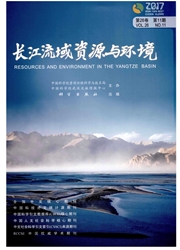

 中文摘要:
中文摘要:
为了解农业资源的总体利用状况和从增产角度评价具体资源投入的合理性,并探讨农业综合产出对各种投入资源的敏感程度,采用了“边际产出量”与“弹性系数”两个参数;又因为实际农业生产中投入的具体资源及形成的产出均有多种,现实中又缺少每种产出与特定资源的对应数据,所以采用TOPSIS法对多种产出及投入的资源进行了综合。研究结果表明,在2000—2009年的多数年份,巢湖种植业的资源投入不断增加(仅从业人员的投入逐年减少),虽然产出也相伴增长,但仍有28.57%的资源利用效率为负;综合产出对农药、灌溉、农膜等资源的敏感性较高。巢湖农业实践表明,适度减少投入也有可能提高产出,这才符合资源节约型农业的要求,是可持续发展需要的资源利用状态;利用效率为负的资源则不宜再追加投入,这种情况下要增产,似应转变生产方式。
 英文摘要:
英文摘要:
Here, we estimate the rationality of specific agricultural inputs and discuss the sensitivity of integrated agricultural output to various resources input for Chaohu City, China. We used two parameters, marginal output and elastic coefficient, and the Technique for Order Preference by Similarity to Ideal Solution (TOPSIS) method, which has an unambiguous geometric meaning and is simple and convenient, to integrate various output and input. The results indicate that for most of 2001-2009, agricultural inputs rose except that the number of people engaged in agricultural production fell. Although integrated agriculture output increased, the proportion of resources with a negative utilization efficiency was 23.82% from 2001 to 2009. Integrated output was more sensitive to agricultural pesticide, the irrigation ratio and the use of plastic film. Integrated outputs may be increased by moderate decreases in input. This type of agricultural production meets the requirements of resource saving and is a sustainable mode of resource utilization.
 同期刊论文项目
同期刊论文项目
 同项目期刊论文
同项目期刊论文
 Provenance of loess deposits in the Eastern Qinling Mountains (central China) and their implications
Provenance of loess deposits in the Eastern Qinling Mountains (central China) and their implications Late Miocene uplift of the NE Tibetan Plateau inferred from basin filling, planation and fluvial ter
Late Miocene uplift of the NE Tibetan Plateau inferred from basin filling, planation and fluvial ter Lu Huayu, Guo Zhengang, 2014. Evolution of the monsoon and dry climate in East Asia during late Ceno
Lu Huayu, Guo Zhengang, 2014. Evolution of the monsoon and dry climate in East Asia during late Ceno Relationship between surface pollen assemblages and vegetation in Luonan Basin, Eastern Qinling Moun
Relationship between surface pollen assemblages and vegetation in Luonan Basin, Eastern Qinling Moun Age and paleoenvironment of Paleolithic stone artifact remains discovered in the Tengger Desert, nor
Age and paleoenvironment of Paleolithic stone artifact remains discovered in the Tengger Desert, nor Loess in the Vojvodina region (Northern Serbia): an essential link between European and Asian Pleist
Loess in the Vojvodina region (Northern Serbia): an essential link between European and Asian Pleist Holocene climatic changes revealed by aeolian deposits from the Qinghai Lake area (northeastern Qing
Holocene climatic changes revealed by aeolian deposits from the Qinghai Lake area (northeastern Qing Can Contaminant Elements in Soils Be Assessed by Remote Sensing Technology: A Case Study With Simula
Can Contaminant Elements in Soils Be Assessed by Remote Sensing Technology: A Case Study With Simula Organic stable carbon isotopic composition reveals late Quaternary vegetation changes in the dune fi
Organic stable carbon isotopic composition reveals late Quaternary vegetation changes in the dune fi 期刊信息
期刊信息
